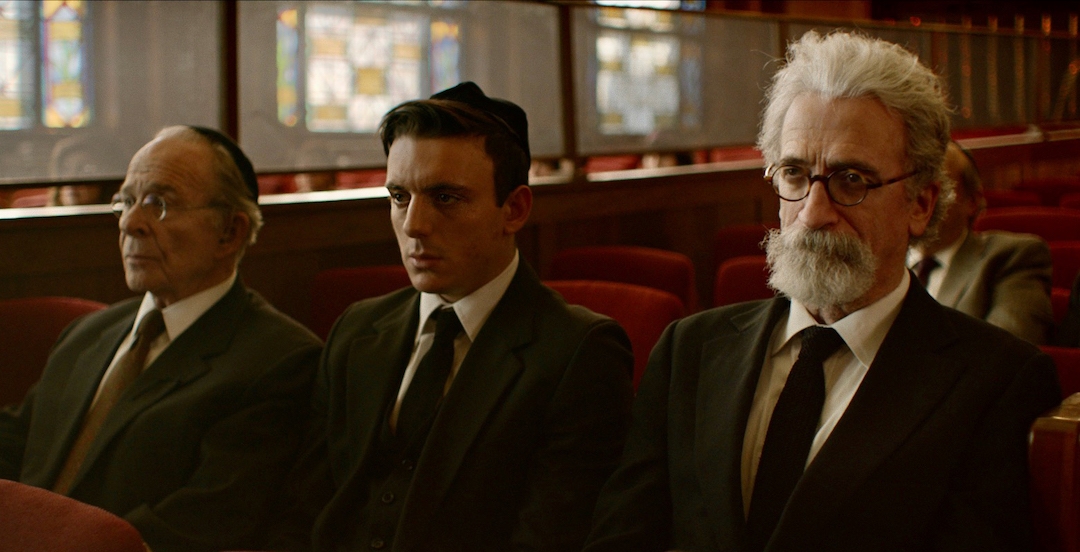(JTA) — A gay Russian Jewish teenager comes of age in Brighton Beach in the touching new independent film “Minyan,” a subtle and sensitive drama that tells an unexpected story about the Brooklyn neighborhood’s large immigrant Jewish community.
Based on a short story by David Bezmozgis, an author who has long grappled with Russian Jewish identity in meticulous and probing ways, Eric Steel’s film finds a unique way to highlight its queer themes through the prism of an Orthodox Jewish culture that heavily prizes manhood, and strength in numbers. If 10 men gathering in prayer is a holy act, the film posits, then surely two men gathering in love must have some degree of holiness to it, as well.
Samuel H. Levine, who riveted Broadway audiences in “The Inheritance,” turns in a fully lived-in lead performance as David, the only son to a family of Soviet Jewish immigrants in 1986. David, whom Levine plays with a quiet, subdued curiosity, feels little affection for his parents: His mother (Brooke Bloom), insistent on sending him to a yeshiva where he is routinely bullied, seems blind to his true needs, while his abusive, philandering father seems to be imparting the wrong ideas about masculinity. To discipline his son for getting into a fight with another yeshiva student who mocks him for being Russian, David’s father sucker-punches him in the face.
Instead, David gravitates to his grandfather Josef (Ron Rifkin), whose calm, matter-of-fact rituals bring him comfort. As the film opens, Josef has decided to seek out a new apartment for himself after the death of his wife. Here we see why the film is called “Minyan”: Josef is only able to secure a fixed-income apartment in a synagogue building once David agrees to join him, because together they give the congregation the requisite 10 men it needs to pray.
In all these buildings full of Jews dealing with repressed generational trauma (the Holocaust and the Soviet Jewish purges are both frequently invoked), David finally discovers a little piece of himself. His neighbors in the synagogue are two elderly men who live together; they have a storyline that explains their arrangement, which the community accepts, but it’s clear they find more comfort in this open secret than they ever could have in the USSR. Soon after meeting them, David begins to explore a local gay bar, and loses his virginity to a brooding bartender (Alex Hurt) who, at the height of the AIDS epidemic, seems shocked by his new lover’s youth and ignorance of the disease — and how David, having already avoided one life of misery at the grace of his parents, is unaware he may now be dooming himself to another.
As David quietly, tentatively tries to navigate his environment (partially with the help of James Baldwin’s books, which are invoked as holy texts on par with anything in the Talmud), “Minyan” finds meaningful ways to frame his maturity alongside his growth in Jewish thought. Aided by David Krakauer and Kathleen Tagg’s klezmer score, the film spotlights the moments when its hero comes into his own: leading a Mourner’s Kaddish prayer, advocating for a fellow Jew’s living conditions or simply listening to his mother describe her relief that she could give him a new life where he wouldn’t be targeted for his Judaism.
Little in Steel’s prior filmography — his most notable previous directing credit was the controversial 2006 documentary “The Bridge,” which secretly filmed a year’s worth of suicides off the Golden Gate Bridge — indicated that he aimed to tackle a story as delicate and human as “Minyan.” But Steel himself grew up gay and Jewish in the 1980s, and he’s smartly fused Bezmozgis’ source material with his own memories to create a film with a personal touch. The movie even feels in league with works by Ira Sachs and Andrew Haigh, the reigning kings of layered, nuanced stories about gay communities, while also being deeply Jewish. “Minyan” is an intimate story of outcasts in many forms.
“Minyan” opens today at the IFC Center in New York and expands to Los Angeles and on-demand rental Oct. 29.
The New York Jewish Week brings you the stories behind the headlines, keeping you connected to Jewish life in New York. Help sustain the reporting you trust by donating today.





